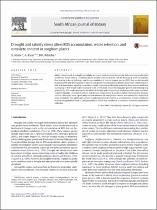Drought and salinity stress alters ROS accumulation, water retention, and osmolyte content in sorghum plants
Abstract
biotic stresses such as drought and salinity are major environmental factors that influence crop productivity
worldwide. These adverse conditions induce osmotic stresses in plant cells by decreasing water availability,
thus leading to loss of cell turgor and the accumulation of reactive oxygen species (ROS) that are detrimental
to plant growth and development. To survive such harsh environmental conditions, plants must initiate intracel-
lular and physiological signaling networks to rapidly respond and efficiently neutralize these stresses. Inefficient
scavenging of ROS would lead to increased levels of cell death, thus inhibiting plant growth and reducing crop
productivity. This study investigates the effect of drought and salinity stress on plant growth, water retention,
oxidative damage, chlorophyll content, and proline accumulation in sorghum plants. Plant growth, biomass,
and leaf chlorophyll were significantly reduced whereas the total proline content was enhanced in response to
stress conditions. The significant increase in hydrogen peroxide content as a consequence of stress conditions
resulted in augmented levels of lipid peroxidation, which was manifested as extensive cell death and biomass
reduction.

